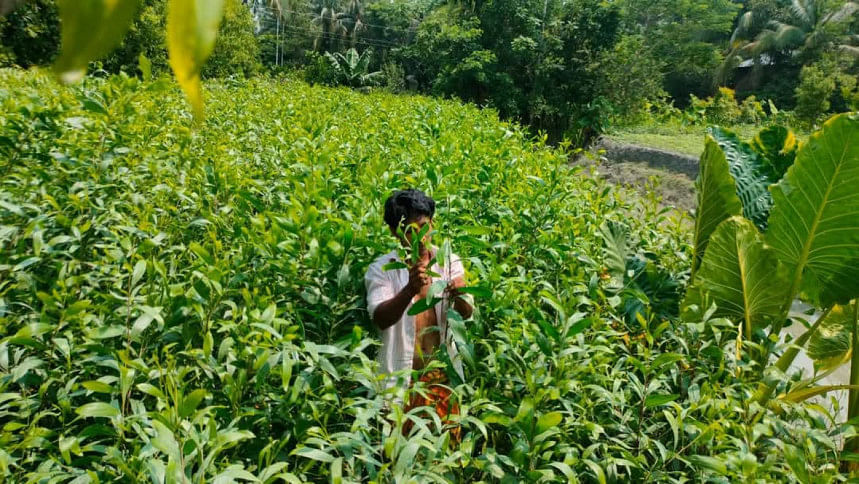Acacia, Eucalyptus saplings in high demand despite ban

Despite the recent government ban, the production, sales and distribution of Acacia (locally known as Akashmoni) and Eucalyptus saplings continue across different areas of southern Bangladesh.
Acacia, for its fast growth, dense wood, and low-cost production, has particurlarly been a year-round favourite for many nursery owners. Some nursery owners even leased arable land to grow Acacia saplings like a regular crop.
The Ministry of Environment, Forest, and Climate Change on May 15 issued a gazette notification officially banning the plantation and sale of Acacia and Eucalyptus saplings, citing environmental concerns.
According to the Department of Agricultural Extension, efforts are underway through local agricultural officers to raise awareness and discourage the production and sale of these harmful plant species.
However, interested buyers can still easily obtain the saplings from local nurseries.
Visiting Nesarabad upazila in Pirojpur and Banaripara upazila in Barishal recently, this correspondent observed that local nursery businesses are still cultivating and selling saplings of these banned trees.
There are approximately 2,100 nurseries in these two upazilas alone. Over 500 of them are operating on a large scale, and are primarily responsible for widespread cultivation and sale of Acacia and Eucalyptus saplings. According to nursery owners, an estimated one million saplings of these species are currently being grown in the region's nurseries.
Nursery owners claimed they were unaware of the ban when they began raising the saplings, and are now left with millions of plants in their nurseries. As such, when buyers approach, they do not hesitate to sell the plants.
The saplings are being sold at wholesale prices of around Tk 15 each. The social forestry programme of the Forest Department was once the largest buyer. Now, with Forest Department's contractors avoiding purchases following the ban, many nursery owners are selling the saplings at reduced prices to private buyers to avoid financial losses as they failed to sell the saplings in time.
Acacia, which matures in just 15 years, was once promoted by the Forest Department to quickly meet timber shortages. Its fast growth made it popular for social afforestation projects, including roadside plantations. However, over time, Acacia has replaced fruit-bearing and medicinal plants in many areas.
"I have several thousand Akashmoni saplings which I am willing to sell at low prices," said Jahangir Alam, owner of Kohinoor Nursery, one of the largest in the region.
In Atghar-Kuriana union alone, over 100,000 Akashmoni saplings were found in various nurseries.
"Earlier, Forest Department's contractors would pre-book these saplings. Now they've stopped buying. Each sapling used to be priced at Tk 15, but I'm willing to sell them for less just to avoid further losses," said Shahjahan Mia, owner of the largest nursery in Sangeetkathi.
Chapal Krishna Debnath, agriculture officer of Nesarabad upazila, said, "We've launched awareness campaigns through our assistant officers. This region grows more fruit and flower trees, so forest species like Acacia and Eucalyptus are relatively fewer. Still, we are working to raise awareness."
Banaripara upazila agriculture officer Mahfuzur Rahman echoed him.
Mohammad Mujahidul Islam, director of DAE in Barishal, said, "These trees absorb excessive groundwater and emit large amounts of carbon dioxide. They are also not avian-friendly tree species and pose a threat to biodiversity. That's why we re discouraging their plantations."

 For all latest news, follow The Daily Star's Google News channel.
For all latest news, follow The Daily Star's Google News channel. 



Comments